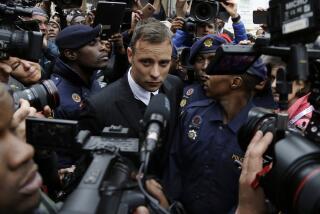Mandela to Go Free, Wife Says : Only Question Is ‘When,’ She Reports After Visit
- Share via
JOHANNESBURG, South Africa — Winnie Mandela, wife of imprisoned African National Congress leader Nelson Mandela--for almost a quarter of a century the symbol of black resistance to South Africa’s apartheid system--said Sunday that his release is only a matter of time.
Although she does not know when her husband will be freed, the question now is “when” and not “if,” Winnie Mandela said on her return to Johannesburg from a visit to Cape Town’s Pollsmoor Prison, where the black leader is being held.
It was her second visit to the prison in less than a week, and she plans another early next week.
Her optimistic comments and the visits themselves add to growing speculation that the government is actively negotiating terms for Mandela’s release and that it could come quickly.
“I do not have the slightest idea when or where he will be released,” Winnie Mandela said, “but he will be released.”
Essa Moosa, a Cape Town civil rights lawyer who is one of the Mandela family’s attorneys, went further to predict: “Soon. I think he will be freed soon.”
The latest speculation about Mandela’s possible release began 10 days ago when President Pieter W. Botha offered to free Mandela on humanitarian grounds, perhaps in an exchange. Botha mentioned two of the Soviet Union’s most prominent dissidents, Nobel Peace Prize laureate Andrei D. Sakharov and Jewish activist Anatoly Shcharansky, and also a South African army commando held by Angola.
Although many diplomats initially dismissed the offer as a joke, the expected release of Shcharansky on Tuesday in a complex, East-West exchange of spies and dissidents suggested that South Africa might indeed have a role. Foreign Minister Roelof F. (Pik) Botha told journalists in Cape Town last Thursday that his government was in contact with other countries on Mandela’s release.
Mandela’s continued imprisonment only serves the African National Congress and the South African Communist Party, the foreign minister said, and his government thus wants to release him but in a way that would not endanger the country’s security.
Mandela, 67, in jail since 1962, is serving a life sentence for attempting to overthrow the government and for sabotage.
South Africa last year offered to release Mandela if he renounced violence as a means of overthrowing apartheid, South Africa’s system of racial separation and minority white rule, and later if he simply went into exile. However, he rejected all the proposed conditions.
On Sunday, Winnie Mandela, who has emerged as a black leader in her own right during her husband’s imprisonment, said he has not relented in his rejection of the government’s terms.
“Not at all,” she replied when asked if he would go into exile, perhaps in London or in Lusaka, Zambia, where the African National Congress has its headquarters.
“When one is released from prison, one goes home. If they sent him into exile, he would be on the first airplane back. There is no question of his accepting that kind of condition,” she said.
Meanwhile, in the country’s continuing civil strife, six more blacks, including three policemen, were killed.
The policemen were shot and hacked to death as they tried to stop a fight between about 500 feuding Zulu and Pondo tribesmen at Amanzimtoti, south of Durban on the Indian Ocean coast.
The other three deaths reported Sunday occurred in scattered anti-government unrest around the country.
One man was killed at White River near the Mozambique border in eastern Transvaal province when police used shotguns to disperse a mob.
Another man died when police fired on blacks attacking a bus depot, bars and police vehicles in a black township outside Klerksdorp, about 100 miles southwest of Johannesburg, according to police headquarters.
In Atteridgeville, west of Pretoria, the body of a 16-year-old youth was found after a clash with police earlier on the weekend.
Police also reported the arrest of three white men on charges of attempted murder in connection with the attacks Saturday on blacks in a northern Johannesburg suburb called Honeydew.
In the incident, four blacks were wounded, two seriously, by several white men who drove through the suburb most of the day firing randomly at blacks.
More to Read
Sign up for Essential California
The most important California stories and recommendations in your inbox every morning.
You may occasionally receive promotional content from the Los Angeles Times.









